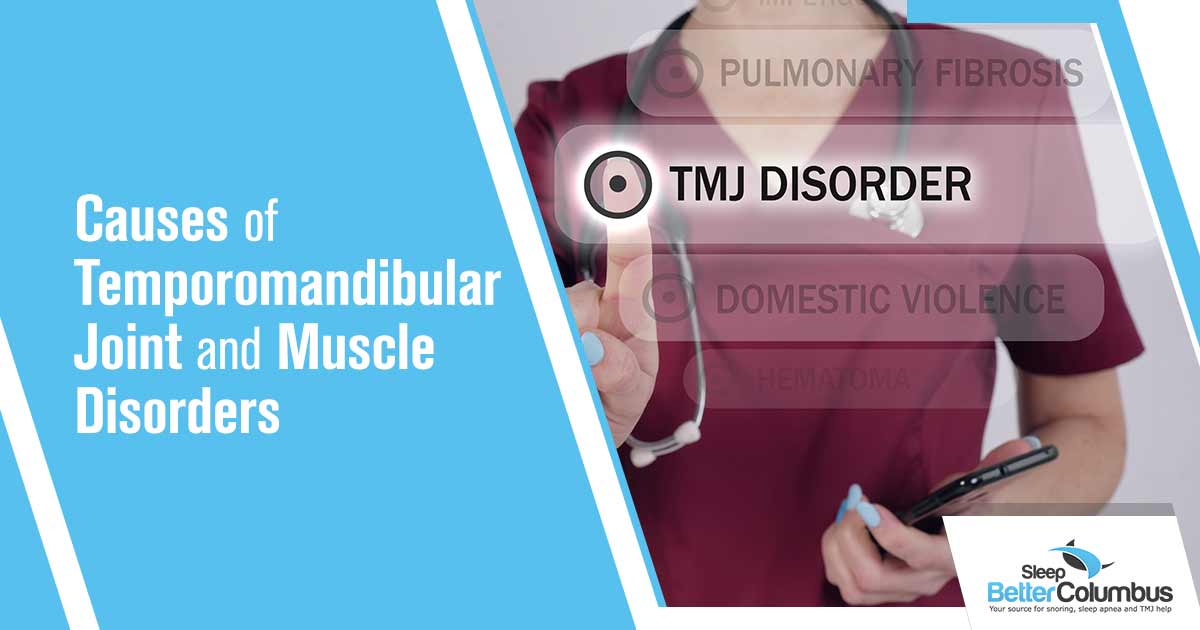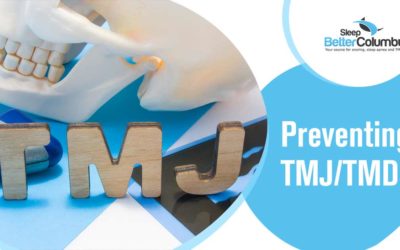The term TMJ Disorder or TMD refers to a group of conditions that affect the temporomandibular joint and the muscles around it. It’s estimated up to 10 million Americans experience the pain, discomfort, and dysfunction in the jaw joint and its surrounding muscles due to some form of TMD. However, the number could be even higher as many cases remain undiagnosed.
People with TMJ issues often don’t seek medical help because the symptoms are intermittent. Although they may manage the condition themselves, painkillers and heat/ice packs only alleviate symptoms temporarily and do not address the underlying issue.
What is a TMJ Disorder?
Although TMJ disorders can vary among individuals, medical professionals, and researchers agree that it can be classified into three basic categories.
1. Myofascial Pain
Myofascial Pain is the most common type of TMJ disorder and involves discomfort or pain in the muscles that control jaw movement. Common symptoms of myofascial pain include headaches, earaches, soreness around the face, neck, and shoulders, and popping or clicking sounds when opening or closing the mouth.
2. Internal Derangement of the Joint
When there is an injury to the condyle, a dislocated jaw, or a displaced disc, it is referred to as internal derangement of the joint. This type of disorder also causes pain and restricted movement, along with a grating sensation when attempting to open the mouth.
3. Arthritis
Arthritis is the third category, which refers to a joint disorder that causes degeneration and inflammation. It can also affect the temporomandibular joint. Symptoms commonly associated with arthritis are joint stiffness, limited range of motion, and chronic pain.
A Combination of TMJ Disorders
When someone is diagnosed with TMJ, they may have one, two, or all three of the associated conditions. Additionally, there are other issues that can coincide with these joint disorders, such as fibromyalgia, sleep disturbances, and chronic fatigue syndrome. Many people with TMJ have a mild form and can collaborate with their dentists and physicians to develop an effective treatment strategy.
Who is at Risk of Developing TMD?
Having certain risk factors can increase an individual’s likelihood of developing TMJ, but it is possible to develop the disorder even without these factors. The presence of multiple risk factors increases the likelihood of having TMJ.
Continuously engaging in stress-related actions like clenching your jaw, biting your lip or objects, grinding your teeth, or chewing gum, ice, or taffy for extended periods can up your risk of developing TMJ. Certain medical conditions can also raise the risk of developing a joint disorder, particularly if you have a misaligned jaw, teeth, or bite. Having jaw or facial deformities may also cause problems with your temporomandibular joint. Conditions like rheumatoid arthritis and osteoarthritis can impact the temporomandibular joint. Additionally, an inflamed membrane lining the temporomandibular joint can cause TMJ. Fractures or dislocations of the face or jaw can also cause long-term problems.
TMJ is more commonly diagnosed in women than in men, with most cases occurring in individuals between the ages of 30 and 50. However, TMJ can also affect men, and elderly patients with poorly fitted dentures may be at risk of developing TMJ.
TMJ Disorder Treatment Options
The treatment for TMJ can vary depending on the cause and severity of your condition. The main objective of the treatment is to alleviate the pain and enhance the functioning of the jaw joint. Sleep Better Columbus’ experts can assist you in identifying the probable cause of your TMJ and initiating a treatment plan that targets the underlying issue with your temporomandibular joint and surrounding muscle tissue, rather than just addressing the symptoms.
Strengthening Muscles and Reducing Jaw Clenching
The treatment options for your condition may involve physical therapy aimed at strengthening the muscles around the affected joint, as well as stretches to alleviate pain and promote muscle relaxation. Additionally, your dentist may suggest using a dental splint while you sleep to prevent teeth grinding and jaw clenching. If you participate in sports, your medical care may involve the use of a mouth guard to safeguard your teeth and jaw.
Lifestyle Changes
Simple changes to your lifestyle can help ease the pain and discomfort caused by TMJ. Proper posture maintenance, reducing stress, practicing relaxation techniques, and avoiding excessive chewing on non-food items, gum, taffy, and ice can significantly reduce or eliminate symptoms.
Medications and Procedures
You can use medications to treat TMJ symptoms. Taking pain relievers during the day can help alleviate any discomfort. Your dentist may recommend a muscle relaxant or sedative to take at night to help your body relax and prevent teeth grinding or jaw clenching. Often this can help reduce or eliminate nighttime jaw clenching and teeth grinding.
There are outpatient procedures available for TMJ treatment. One of them is joint irrigation, which involves rinsing away debris and has helped some patients. Surgery is usually a last resort and only recommended in extreme cases.
Consult the TMJ Disorder Specialists at Sleep Better Columbus
TMJ can be a painful and debilitating condition if left untreated. Fortunately, there are numerous treatment options available to help reduce the symptoms of TMJ and improve the functioning of the jaw joint.
Sleep Better Columbus‘ team of experienced dentists can assist you in finding a personalized solution for your TMJ condition and helping you enjoy life without pain or discomfort. With the right diagnosis and treatment plan, you can live a pain-free life with maximum jaw functioning. Contact us today to learn more about our comprehensive approach to treating TMJ disorders. We look forward to helping you find the ideal solution for your condition!




